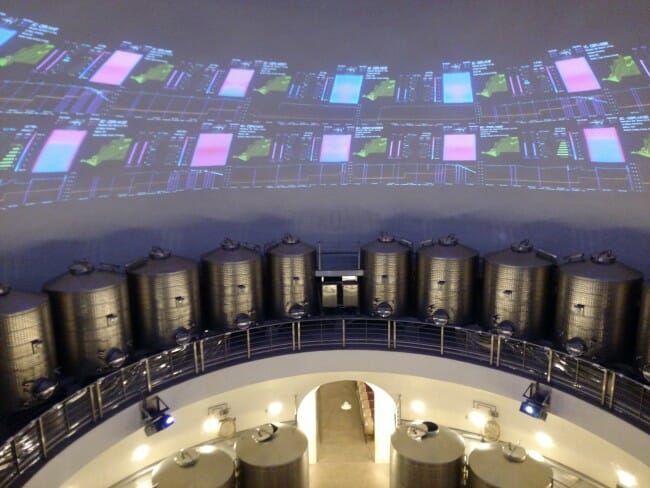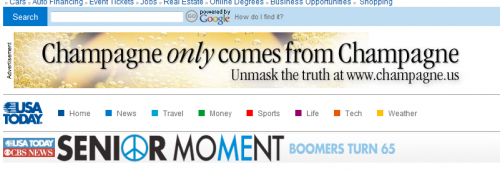My Nomination for Corporate State of the Year: Napa County, California
Last week I went on a wine-tasting tour in the Napa Valley with a bunch of friends who are passionate about wine. It was an odd experience, because I am not passionate about wine and do not have the tasting ability to discern many differences between the wine. I could tell it was a red wine, and maybe if it was dry or fruity, but hints of tobacco and blackcurrent? Not so much. It was also weird to be in a place where I really was not very passionate (wine is behind both beer and cocktails in my drinking hierarchy) but I was surrounded by people with a an excess of passion -- by people who seem to build their whole life around wine. There was a lot of competitive one-upsmanship and virtue signalling going on around wine that I only barely understood. I would equate the whole experience with my wife's experience at Comicon, standing in line behind two guys passionately arguing about comic book hero backstories. I tried my hardest to be tolerant of those who had really different interests than I have, though I will say that this tolerance was NOT shared by most wine enthusiasts who treated me as demonstrably defective when I admitted that wine did not do that much for me.
Anyway, at each tour we typically got the whole backstory of the business. And the consistent theme that ran through all of these discussions was the simply incredible level of regulation of the wine business that goes on in Napa. I have no idea what the public justification of all these rules and laws are, but the consistent theme of them is that they all serve to make it very hard for small competitors or new entrants to do business in the county. There is a board, likely populated by the largest and most powerful entrenched wine makers, that seems to control the whole regulatory structure, making this a classic case of an industry where you have to ask permission of your competitors to compete against them. There are minimum sizes, in acres, one must have to start a new winery, and this size keeps increasing. Recently, large winemakers have started trying to substantially raise this number again to a size greater than the acreage of any possible available parcel of land, effectively ending all new entrants for good. I forget the exact numbers, but one has to have something like 40 acres of land as a minimum to build a structure on the land, and one must have over 300 acres to build a second structure. You want to buy ten acres and build a small house and winery to try your hand at winemaking? -- forget it in Napa.
It took a couple of days and a bunch of questions to put this together. Time and again the guide would say that the (wealthy) owners had to look and wait for a long time to find a piece of land with a house on it. I couldn't figure out why the hell this was a criteria -- if you are paying millions for the land, why are you scared to build a house? But it turned out that they couldn't build a house. We were at this beautiful little place called Gargiulo and they said they bought their land sight-unseen on 3 hours notice for millions of dollars because it had a house AND a separate barn on it grandfathered. Today, it was impossible to get acreage of the size they have and build two structures on it, but since they had the barn, they could add on to it (about 10x the original size of the barn) to build the winery and still have a separate house to live in.
This is why the Napa Valley, to my eye, has become a weird museum of rich people. It seems to be dominated by billionaires who create just fantastically lovely showplaces that produce a few thousand cases of wine that is sold on allocation for 100+ dollars a bottle to other rich people. It is spectacularly beautiful to visit -- seriously, each tasting room and vineyard is like a post card, in large part because the owners are rich enough to care nothing about return on capital invested in their vineyards. The vineyards in Napa seem to have some sort of social signalling value which I don't fully understand, but it is fun to visit for a few days. But in this set-piece, the last thing the folks who control the county want is for grubby little middle-class startups to mess up their carefully crafted stage, so they are effectively excluded.
I know zero about wines, but from other industries this seems to be a recipe for senescence. It would surprise me not at all to see articles get written 10 years from now about how Napa wines have fallen behind other, more innovative areas. I have never been there, but my friends say newer areas like Paso Robles has an entirely different vibe, with working owners on small plots trying to a) actually make a viable business of it and b) innovate and try new approaches.
Postscript: The winner of the cost-no-object winery award had to be Palmaz. Created by one of the folks who invented the heart stent, it was a wonderfully eccentric place. The owner theorized years ago that pumping wine (something that is done at many steps to transfer it between process steps) hurts the wine by breaking up longer chain tannin molecules (search me if this is true). Anyway, he wanted everything gravity fed, but that meant you needed grapes to come in at the top, with fermenters below that, and filters below that, and wine barrels for aging below that. Well, if you have been reading this post, you can guess that a building tall enough for this certainly can't be built in Napa. So he carved it out of a mountain. Seriously, this place is like NORAD, with probably a mile of underground passages stacked 18 stories deep from top to bottom. In the center of the mountain is this room:
In a circle behind the railing are fermenters on a train track that can rotate as a group all around like a giant carousel to position them under the grape chute or over the filters. The room is carved out with a giant dome, and on the dome are projected process control data about each grape or wine batch. It was truly incredible. (More about it online here)
Don't get me wrong, I love this. It is a pleasant eccentricity, from which others can benefit. And the wine was good, at least to my admittedly weak evaluation skills. I just hate it that the arbiters of the Napa Valley feel the need to exclude others who want to use their own land in different ways.
Update: A Coyote Blog reader writes that they ARE doing things differently making wine in Paso Robles. Here is his web site and story.

